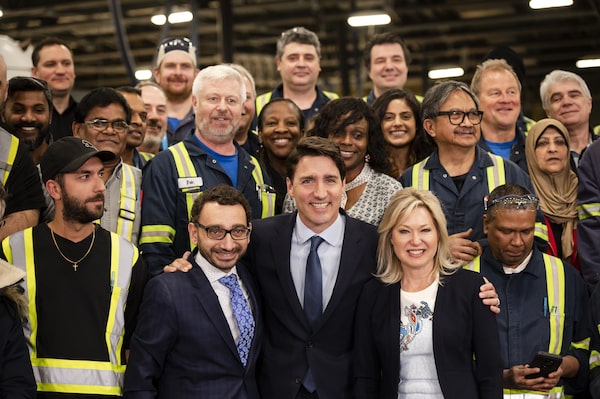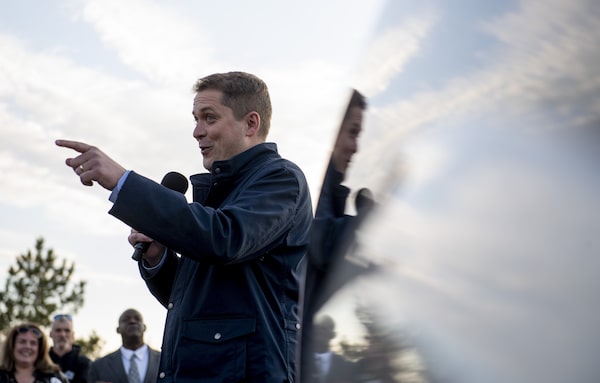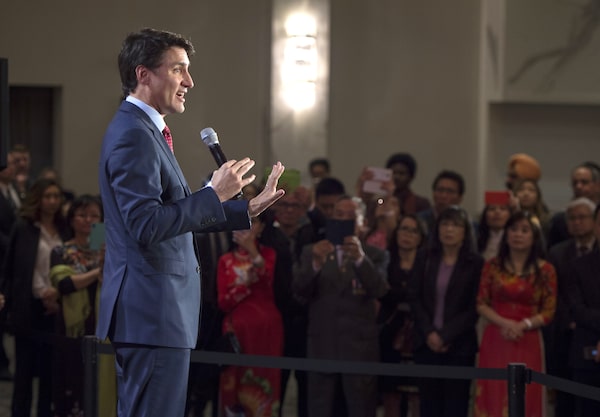The sleek condo towers of downtown Mississauga loom behind the 1980s- and '90s-era row housing of the GTA city where Justin Trudeau faces one of his key electoral tests this fall.J.P. Moczulski/The Globe and Mail
A bond has been broken between Justin Trudeau and the voters of Mississauga Centre. If he is to remain prime minister after Oct. 21, Mr. Trudeau must reforge that bond.
Mississauga Centre is a typical 905 riding, which is why I spent time here before the last election and returned to it recently.
The suburban belt known as the 905, after its area code, includes 30-or-so ridings (depending on how you count) encompassed by the regions of Halton, Peel, York and Durham – or from Burlington in the southwest to Clarington in the east.
The suburban ridings of Toronto itself often vote in lockstep with the 905, as do other suburban ridings in Ontario and in British Columbia’s Lower Mainland.
Electorally, these are the most important ridings in Canada because there are so many of them, because they tend to vote as a block, and because they tend to swing. In every election but one since Pierre Trudeau became prime minister, suburban ridings surrounding Toronto have voted for the party that formed government.

Prime Minister Justin Trudeau seen during an event this past March alongside Mississauga Centre MP Omar Alghabra, left, and Mississauga Mayor Bonnie Crombie, right.Christopher Katsarov/The Canadian Press
Although Mississauga Centre was created as part of the 2012 redistribution and expansion of Commons seats, had the riding existed in 2011, it would have gone Conservative. But in 2015 voters elected Liberal MP Omar Alghabra.
Some of those voters remain loyal. But in three days of conversations in a shopping mall, in a local park, at a community centre, on neighbourhood streets, at the city’s performing arts centre, many voters living in the riding or visiting from similar ridings nearby expressed disquiet with the government.
They feel let down by Mr. Trudeau’s performance as prime minister. Some mentioned the fashion malfunction in India; others, the deteriorating relations with China, or the decision to buy a pipeline that hasn’t been built. Some complained about increased taxes with nothing that they can see to show for it.
And the loss of two female cabinet ministers over some internal dispute. Most people were hazy on the details of the SNC-Lavalin affair, but they didn’t like the sound of things one bit.
Sunny ways have turned to twilight.
Above: A GO Train passes over Highway 403. Below: New condo towers under construction rise up in downtown Mississauga.
J.P. Moczulski/The Globe and Mail
That doesn’t mean the Liberals are doomed to lose Mississauga Centre and others like it. Most people have little idea of who Conservative Leader Andrew Scheer is and what he stands for, other than not being Mr. Trudeau.
And in several dozen engagements – from brief chats to lengthy conversations – not one person mentioned NDP Leader Jagmeet Singh, even though he hails from next-door Brampton.
But voters feel let down. They approach October’s federal election, wary, distrustful, disappointed. They won’t easily trust again.
Lee Pomeroy has voted Liberal his entire life, and wants to vote Liberal again, but he’s beside himself over Mr. Trudeau, especially over the SNC-Lavalin affair. “He just keeps digging the hole deeper and deeper and deeper,” the retired banker mourns, as he munches on popcorn in a food court while waiting for his wife to return from shopping.
Efforts by the Prime Minister and his advisers to influence the prosecution of the engineering firm SNC-Lavalin, which led to the resignation of cabinet ministers Jody Wilson-Raybould and Jane Philpott, has left him deeply concerned.
“The whole thing just leaves a very bad taste in your mouth,” he said.
Above: A couple walks through the Square One shopping complex's parking lot. Below: Families and children play on the artifical turf at Celebration Square beside City Hall.
J.P. Moczulski/The Globe and Mail
A mixture of modest row housing from the 1960s and 70s, solid brick homes fronted by two-car garages from the 1980s and 90s, and clusters of new, glass-sheathed condo towers surrounding a city centre anchored by the enormous Square One shopping mall, Mississauga Centre is diverse, fast-growing and dominated by immigrants – another characteristic of many ridings in the 905.
The population of just under 125,000 increased by 5 per cent between 2011 and 2016, according to Statistics Canada. Just over 60 per cent of the population are immigrants, most of whom arrived after 2000. Seventy per cent of the riding’s residents belong to a visible minority. About 40 per cent of those visible minorities are South Asian, while 17 per cent are Chinese. Arabs make up 12 per cent, while blacks and Filipinos each account for 9 per cent.
At Indus Community Services, which originally focused on helping South Asians new arrivals adapt to their new homeland but now has a fully multicultural clientele, the English-language classes are dominated by women and men from places such as Syria and Afghanistan, the latest wave of new Canadians.
Many homes, according to Gurpreet Malhotra, CEO of Indus Community Services, contain an extended family of some sort – from grandparents to children – or the families of two brothers. These homes may have illegal basement apartments. The secret, Mr. Malhotra says, is to look at how many cars are parked in the driveways in front of those two-car-garage homes. Indeed, a drive through neighbourhoods in the northeast and northwest quadrants of the riding reveals a surprising number of homes with three or four cars crowded in front.
Mr. Malhotra is confident that Mississauga Centre will remain Liberal. “We are in good times,” he observed, with record low unemployment. And he believes that new Canadians can detect anti-immigrant sentiment coming from some elements within the Conservative coalition. “They hear the dog whistles.”
But there are tensions between newcomers and those who are native-born in the suburbs. Christine Delprete told me the Trudeau Liberals tax the savings of hard-working families such as hers, “and give it to others,” listing immigrants and refugees as one of the groups receiving benefits. “He’s not for the middle class.” She voted for Mr. Trudeau in 2015, but feels let down, “and everyone I talk to feels the same way.”
She is a dental hygienist and her husband Angelo is a painter. “We do well, but we struggle,” she says, as Mr. Delprete nods his head in agreement.
Far beyond these complaints are those of John Fedorko, who was waxing the SUV parked in front his brick home on a pleasant weekend morning. He believes that Justin Trudeau is completing the ruination of the country begun by his father.
A factory worker and third-generation Canadian, Mr. Fedorko is convinced immigrant Canadians “aren’t proud of Canadian culture." He is a strong supporter of U.S. President Donald Trump. I suggested Maxime Bernier’s new People’s Party might interest him, but he shrugged. No political leader in Canada impresses Mr. Fedorko right now.

Mr. Trudeau has been targeting Conservative Leader Andrew Scheer on connections to the far right.Justin Tang/The Canadian Press
Mr. Trudeau is making race and immigration key issues in the lead-up to the election. “Andrew Scheer conveniently failed to call out alt-right conspiracy theories,” he said at a rally in Mississauga in mid-April, referring to groups espousing white-supremacist ideologies. "Andrew Scheer fought against a non-binding motion to denounce Islamophobia. And Andrew Scheer has proudly spoken at the same rallies as white nationalists.”
That last claim is particularly incendiary. Last February, Mr. Scheer spoke at a pro-pipeline rally in Ottawa that included anti-immigration protesters, though he insisted he was unaware they were present, and has repeatedly denounced white racism and those who espouse it.
For most of the people I talked to, however, immigration never came up as an issue. Christina and Rob Payne were pushing two-month old Mackenzie in a stroller as they shopped in Square One. Rob doesn’t know who he will vote for; Christina will vote for Mr. Scheer, because “I haven’t liked Trudeau from day one.” They agreed long ago not to discuss politics.
They don’t like the Liberals’ re-orientation of the Canada Child Benefit toward middle-and-lower income couples, which left them with less each month than under the Conservative plan. They worry about climate change, but also worry about what the federal carbon tax will do to their gas bills. And like many of those interviewed, they expressed a general unease about the state of the economy, the weight of taxes, and the lack of services.
And then there’s Jacob Wylde, a 20-something who works in a café. “Canada’s image in the world has taken a bit of hit,” under the Liberals,” he says, coming out of the gym on a grey weekday afternoon. Mr. Wylde’s family came to Canada from India when he was five, and he was not impressed with Mr. Trudeau’s embarrassing Indian sojourn.
But he doesn’t know much about either Conservative Leader Mr. Scheer or NDP Leader Mr. Singh. He voted Liberal last time, but this time, “I’m questioning.”
There were others whom the Liberals can count on. The three older women of South Asian background who were sitting and chatting at a community centre confessed they had given the election no thought at all, but when asked how they’ll vote looked at each other and nodded:
“Trudeau."
"Trudeau.
"Trudeau.”
This is, in part, the power of incumbency, of name recognition, and of a government that targets support for the elderly and lower-income-middle-class-workers.
And there are others who fear the rise of the same sort of intolerant populism that is on the rise across Europe, and that propelled Mr. Trump to the U.S. presidency, “We live in turbulent times,” said Anastasios Triantafilou, an educator in next-door Oakville who was running errands in Mississauga. “We are not immune to the criticism we hurl at other nations. We have lost our innocence.”
He doesn’t know yet who he will vote for, but it certainly won’t be Mr. Scheer.

Mr. Trudeau speaks at a Liberal Party event in Mississauga on May 1.Frank Gunn/The Canadian Press
The election is still Mr. Trudeau’s to lose. No party has been defeated after a single term of majority government since R.B. Bennett’s Conservatives in 1935.
However dismayed Mr. Pomeroy is by the SNC-Lavalin affair, he detested Stephen Harper’s Conservative government, and doesn’t think much of his successor Mr. Scheer.
“I’ll probably hold my nose and vote Liberal,” he sighs.
But the good will that surrounded this prime minister in the early years of his mandate is gone. No more sunny ways. No more hope and hard work.
With some polls showing Mr. Trudeau more unpopular than either Mr. Scheer or Mr. Singh, the implicit Liberal message in this election campaign will be: Whatever you think of us, the other guys are worse.
People like Grace Wu hold the key. A homemaker from the adjacent neighbourhood of Etobicoke, who was cheering on her daughter at a dance competition at the Living Arts Centre one rainy Sunday afternoon, she said she voted Liberal in 2015, but is unimpressed by the government’s accomplishments, and deeply concerned by the resignations of Ms. Wilson-Raybould and Ms. Philpott.
“My gut tells me something is just not right,” she said. But she remains undecided. “I may give him another chance, depending on what he tells me can do for me.” And she believes Mr. Trudeau must explain the SNC-Lavalin affair.
“He still hasn’t apologized.”
Distrustful, disappointed, but not yet ready to make a break, voters in Mississauga Centre and its cousins are teetering. Everything depends on where those votes finally come to rest.
 John Ibbitson
John Ibbitson